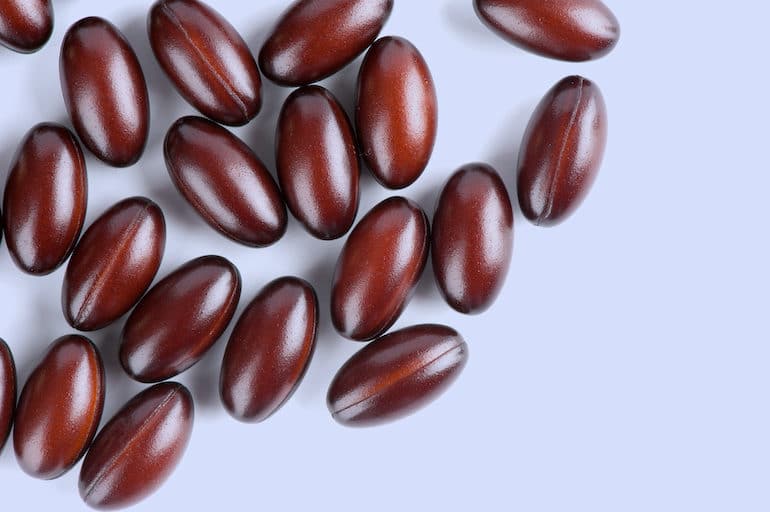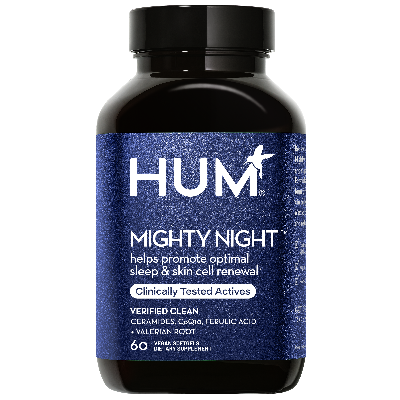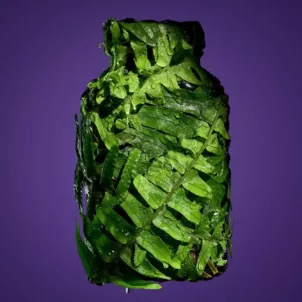Can a CoQ10 Supplement Renew Your Skin?
By Carrie Gabriel, MS, RDN •
October 9, 2019
You might have seen the scientific-sounding ingredient of CoQ10 in some of your favorite anti-aging and reparative skincare products. But what is it exactly, how does it work, and can a CoQ10 supplement boost these skincare benefits even further? Carrie Gabriel, MS, RDN, investigates.

What Is CoQ10?
Coenzyme Q10 (aka CoQ10) is a compound used to produce energy to help fuel cell growth and and protect cells from oxidative damage. This protein is naturally found in the heart, lungs, kidneys, and liver—but the skin is also one of its most abundant sources.CoQ10 & Your Skin
CoQ10 is a powerful antioxidant that can halt free radical damage to the skin brought on by exposure to harmful UV rays, chemicals, and pollutants. Levels of naturally occurring CoQ10 within the skin rise from childhood to adulthood. They peak at 20-to-30 years of age and then gradually diminish over time. For that reason, you should opt for external sources of CoQ10 to reap their skin-boosting (and health) benefits. Research shows that CoQ10 is effective for skin health in both topical and ingestible forms. When used consistently over the course of at least a few months, CoQ10 can help minimize the appearance of wrinkles, promote cell renewal, and protect the skin from further damage.
Start from the Inside Out
While you can apply CoQ10 topically, it’s also readily found in both a variety of foods and ingestible supplements.CoQ10 Foods
Muscle meats like pork, beef, and chicken—plus organ meats like heart, liver, and kidney—are primary dietary sources of CoQ10. Fatty fish like trout, herring, and sardines are also key CoQ10 foods. For our plant-based friends, vegetables such as spinach and cauliflower and fruit such as oranges and strawberries are also go-to sources. Furthermore, soybeans, lentils, peanuts, sesame seeds, and pistachios contain the antioxidant. Some sources say we can’t get enough by solely ingesting it in food form, so opt for a CoQ10 supplement to adequately reap the benefits.CoQ10 Ubiquinol vs. Ubiquinone
CoQ10 comes in two different forms: ubiquinol and ubiquinone. Ubiquinol is more absorbable and accounts for most of the CoQ10 in our blood. Ubiquinone, on the other hand, is the oxidized form that the body must metabolize into ubiquinol to activate its protective properties. Simply put, ubiquinol is the recommended form for CoQ10 supplements.Best Practices
Because CoQ10 is a fat-soluble compound, its absorption is gradual. However, taking CoQ10 supplements with food—especially oils—can help your body absorb it up to three times faster than taking it on an empty stomach. Also, our bodies don’t store CoQ10, so you should use it regularly to see benefits for your skin or otherwise.Who Shouldn’t Take CoQ10?
Breastfeeding and/or pregnant women should avoid CoQ10 supplementation, as the research is insufficient on whether it’s safe and efficient for this population. Next, if you’re taking prescription medications for your thyroid, blood pressure, or other health concerns, consult your doctor before adding a CoQ10 supplement to your regimen.More like this









